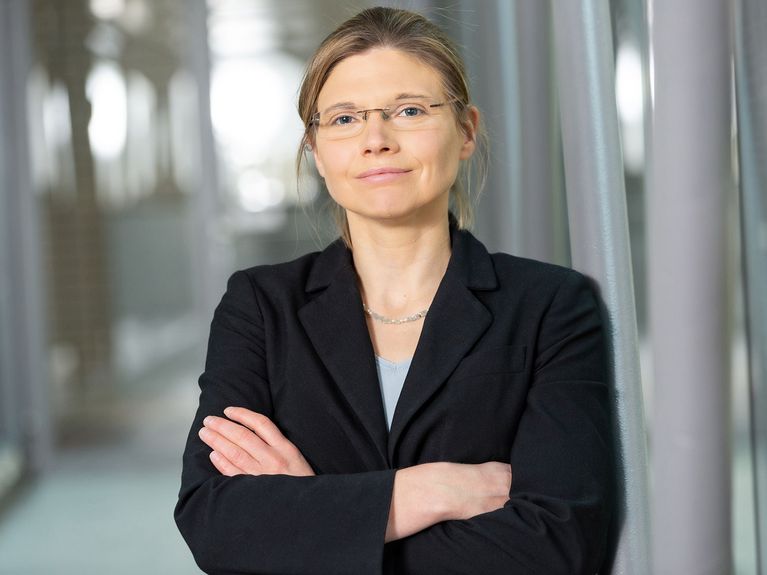Interview
“Even in Germany, people still contract tuberculosis”

Dr Berit Lange studied medicine in Freiburg, Spain, Chile and Peru and epidemiology in London, later specializing in infection epidemiology. She conducts research at the Helmholtz Center for Infection Research in Braunschweig, where she is acting head of the Department of Epidemiology. On March 12, she will attend a meeting of the STIKO for the first time as a new member. Picture: Verena Meier / HZI
Physician and epidemiologist Berit Lange from the Helmholtz Centre for Infection Research, who has just been appointed to the STIKO, talks about bringing a breath of fresh air to the committee, lessons learned from the coronavirus pandemic, and an often underestimated disease.
Congratulations on your appointment to the STIKO! Were you expecting this award?
Dr. Berit Lange: To be honest, the appointment was not entirely unexpected. I received a letter last December asking me if I could imagine taking on such a role. So I was forewarned, so to speak, but of course I still have great respect for this task.
How long has this committee been in existence?
The STIKO was founded in 1972, more than half a century ago. Many parents are familiar with its recommendations as a basis for deciding which vaccinations their children should receive, but some people have only recently become aware of it in the wake of the Coronavirus pandemic. The STIKO is politically independent and the researchers work for it on a voluntary basis. There are various working groups, such as the Influenza Working Group or the Measles, Mumps, Rubella Working Group, which prepare the individual recommendations. Members bring their expertise to the table.
Do members change frequently?
In the last three-year appointment periods, there were always new members. In 2023, the maximum number of appointment periods has now been limited to three. Personally, I think that makes sense. It is sometimes necessary to be able to bring additional and new expertise to this body. At the same time, however, it is of course extremely important to ensure continuity and efficiency as the STIKO must be able to act at all times.
What is decisive for an appointment? As many scientific publications as possible?
Of course, relevant scientific work plays a role. But the committee is very interdisciplinary, in order to cover different areas of expertise: There is general medical expertise as well as expertise in virology, pediatrics and communication sciences. I myself have worked on large studies and meta-analyses on the efficacy and side effects of vaccinations and carried out modelling on the spread of infections, but also treated and vaccinated patients during my time in clinical infectiology as a hospital doctor. I assume that these different experiences have been taken into account.
What are you currently researching at the Helmholtz Centre?
In the Department of Epidemiology we understand the dynamics and burden of infectious diseases through modeling, evidence synthesis and epidemiological studies. We then develop and evaluate interventions and (digital) tools to reduce this burden. For example, we use meta-analysis to combine the results of many previously published studies by other teams on a topic and try to identify common findings. On this basis, we then support the development of guidelines, for example, for the prevention of tuberculosis, which is still one of the world's leading infectious diseases.
But at least in Europe, tuberculosis has been largely eradicated, hasn’t it?
Unfortunately, no. In Eastern Europe, for example, in Belarus or Ukraine, many people still contract tuberculosis. Many people in Europe are still dying of this disease, even though it is an easily treatable infection. In Germany, too, people still contract tuberculosis and it often takes too long for us to diagnose and treat it.
COVID-19 isn’t causing many problems this winter. Does that surprise you?
No. In principle, the spread of SARS-CoV-2 and the burden of COVID-19 are consistent with what we predicted in the MONID severe infectious disease modeling network for the 2023/24 season (www.monid.net). The fact that only a few patients with SARS-CoV-2 infection have recently required hospitalization is largely due to the fact that many people have now acquired protection against severe disease through vaccination or infection. Of course, many people continue to fall ill with coronavirus, which leads to staff absences. Many of these people also suffer from long-term complications.
What can epidemiology learn from the Coronavirus pandemic?
During the pandemic, it became clear that we lacked relevant research infrastructures in infection epidemiology. We are now establishing them. They are necessary for both good infection research and pandemic preparedness: In particular, a network of population-based studies that can quickly detect the spread of pathogens. This will allow for an even better epidemiological assessment of different infections in the future. Of course, this requires sustainable funding.
Readers comments